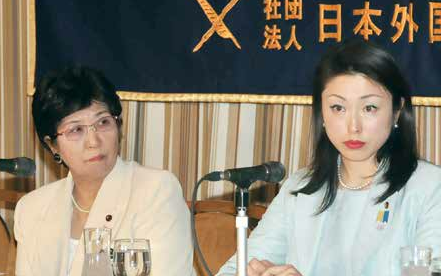Issue:
A Club Member believes he’s still owed an answer to a press conference question
When two right-wing politicians came to the FCCJ on Feb. 25 to express their views on the “comfort women” issue, the audience had a good opportunity to understand how the right thinks in Japan.
Yoshiko Matsuura and Tomoko Tsujimura, both municipal politicians from Tokyo’s western suburbs, spoke about their travels to Glendale, California, to protest the erection of a “comfort woman” statue in a public park. They took with them a letter addressed to Glendale’s mayor from the Japan Coalition of Legislators against Fabricated History, signed by hundreds of Japanese legislators.
Here are some excerpts:
l “We are committed to instilling a fairminded, accurate perception of history in our children.”
l “Japanese military authorities never forced Korean women to engage in prostitution. The comfort women were part of a legally sanctioned prostitution system, similar to others in existence throughout the world. They were handsomely remunerated; the word ‘sex slaves’ is an inaccurate description of the comfort women.”
l “Japan is a nation whose culture places great value on women, as evidenced by the fact that works about romantic love were created by women writers such as Murasaki Shikibu.”The speakers, like other right-wingers, claimed that the Japanese military never abducted women. And they absolve Japan entirely by blaming recruitment on local agents. This is to some extent true, but there is little doubt that the agents were working on behalf of the military and that the military was fully complicit in these crimes against humanity. Whatever the chain of command may have been, the women were conned into working for Japanese military brothels. If they had been independent prostitutes, as the Japanese claim, then they would have been free to go where they wanted and sleep with whomever they wanted. Instead, they were textbook examples of human trafficking.
I had a simple question for these women. “Were Koreans forced to work in the mines in Oita?” As you can see on the video (www.youtube.com/watch?v=LfL8f571hCU), they dodged the question. At first, they said they were only there to talk about comfort women before rambling on about how Koreans and Japanese were working together to win the war, which I thought showed they had a sense of humor until I realized they weren’t joking.
But the question had a purpose. My Korean father-in-law, Lee Jae Hyun, was forced to work in the mines in Oita during the war. Having known him as a man of unimpeachable integrity, I know that his speaking out was not a trick to get money from the Japanese government or companies. In fact, it was a painful memory for him and one he only shared with his family a few years before he died.
So I wanted to know what Matsuura and Tsujimura thought about Korean workers in Kyushu. Were Koreans like Lee Jae Hyun forced to work down the mines? Their reluctance to answer spoke volumes.
If they believed (and I’m sure they did) that Koreans were forced to work, then it shouldn’t be a surprise if women were forced to work in brothels for the military. If they had said Koreans weren’t forced to work in the mines, then they were calling my father-in-law a liar. I know he wasn’t. So for me, their arguments have zero validity.
One of the disturbing aspects of the FCCJ press conference was how Matsuura and Tsujimura sought to turn the issue into a Korean attack on Japanese. Tsujimura claimed that Japanese schoolchildren were being bullied by Korean kids in California and asserted that this amounted to “racial discrimination.” She is obviously unaware that Japanese and Koreans are of the same race.
While the statue in Glendale was erected largely at the behest of Koreans, it represents the sex slaves of many nationalities. Dutch, Australian and many Asian women were victims of the comfort women system. Australian Jan Ruff-O’Herne is one of those former sex slaves who have spoken out on the issue. Like others, she didn’t want to revisit the past, but Japan’s denials of the Korean comfort women forced her to speak out 50 years later.
That people are still suffering was brought home to me several years ago on a visit to England with my Japanese girlfriend, when we went to visit my friend Debi at her parents’ house. When Debi’s father heard a Japanese was coming to his house, he walked out and refused to return until we had gone. Having been a prisoner of war in Singapore, the mere thought of hearing Japanese or being in the same room as a Japanese filled him with painful memories.
For him, it was a reminder of the hate and violence he experienced. The comfort women are reminded of that hate every day not only through their own experiences, but also through the persistent attempts by Japan to deny that such atrocities ever took place. Would Matsuura and Tsujimura call Debi’s father a liar, like they do my father-in-law?

Fred Varcoe is a Chiba-based freelance journalist and reluctant historian

